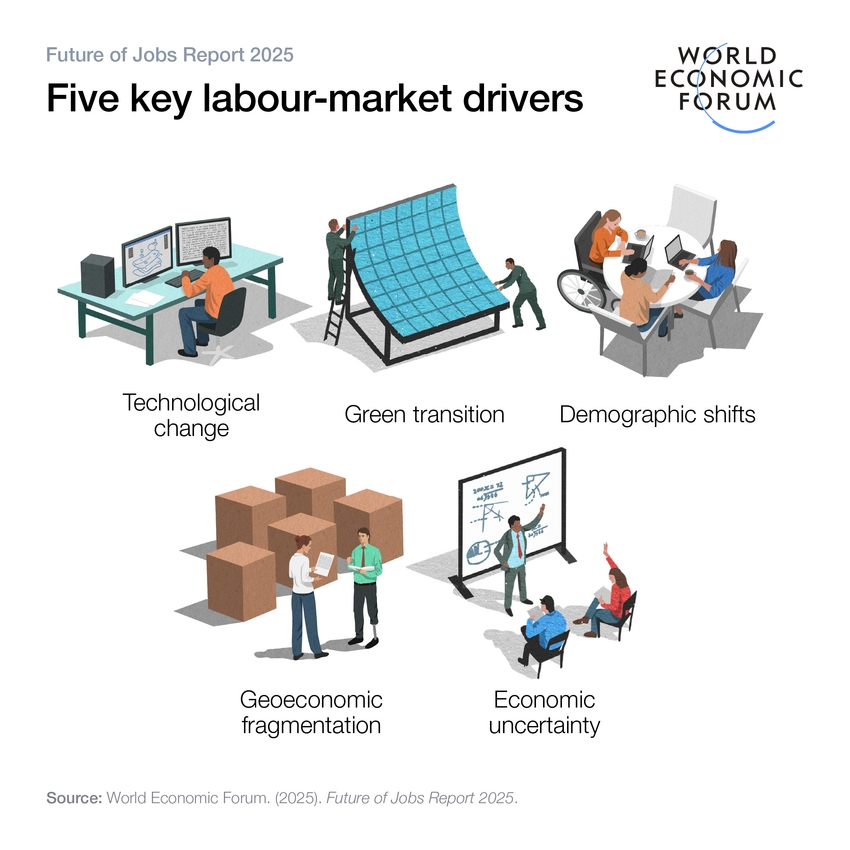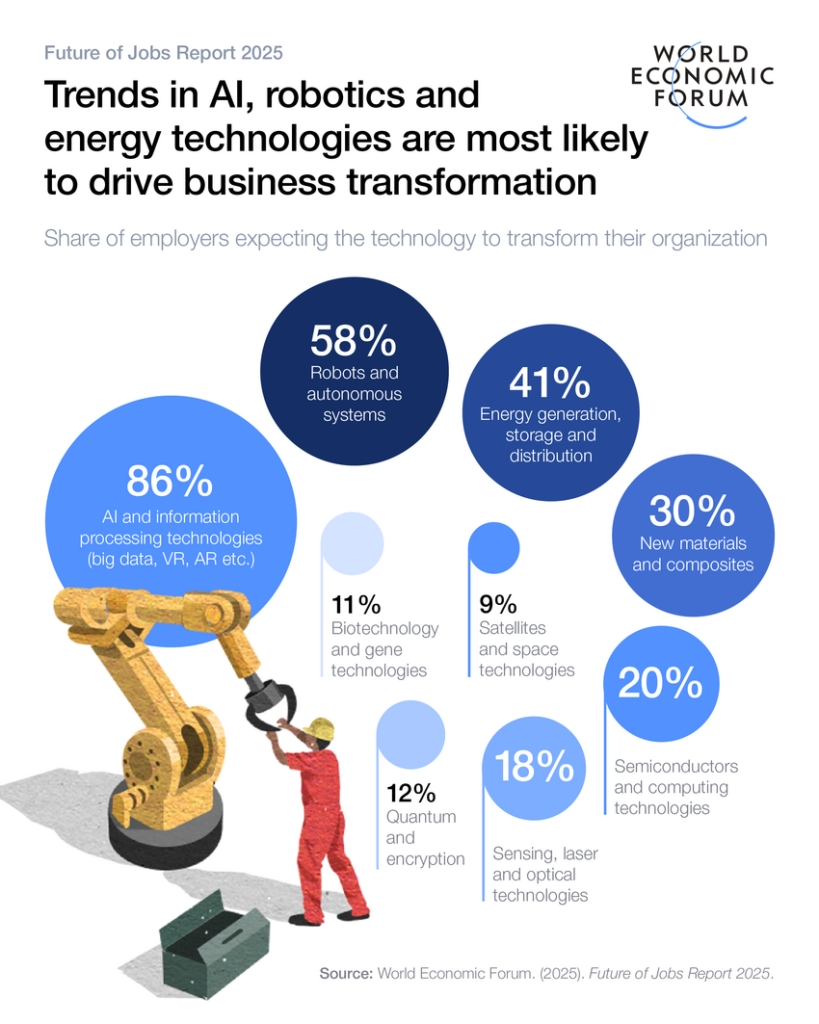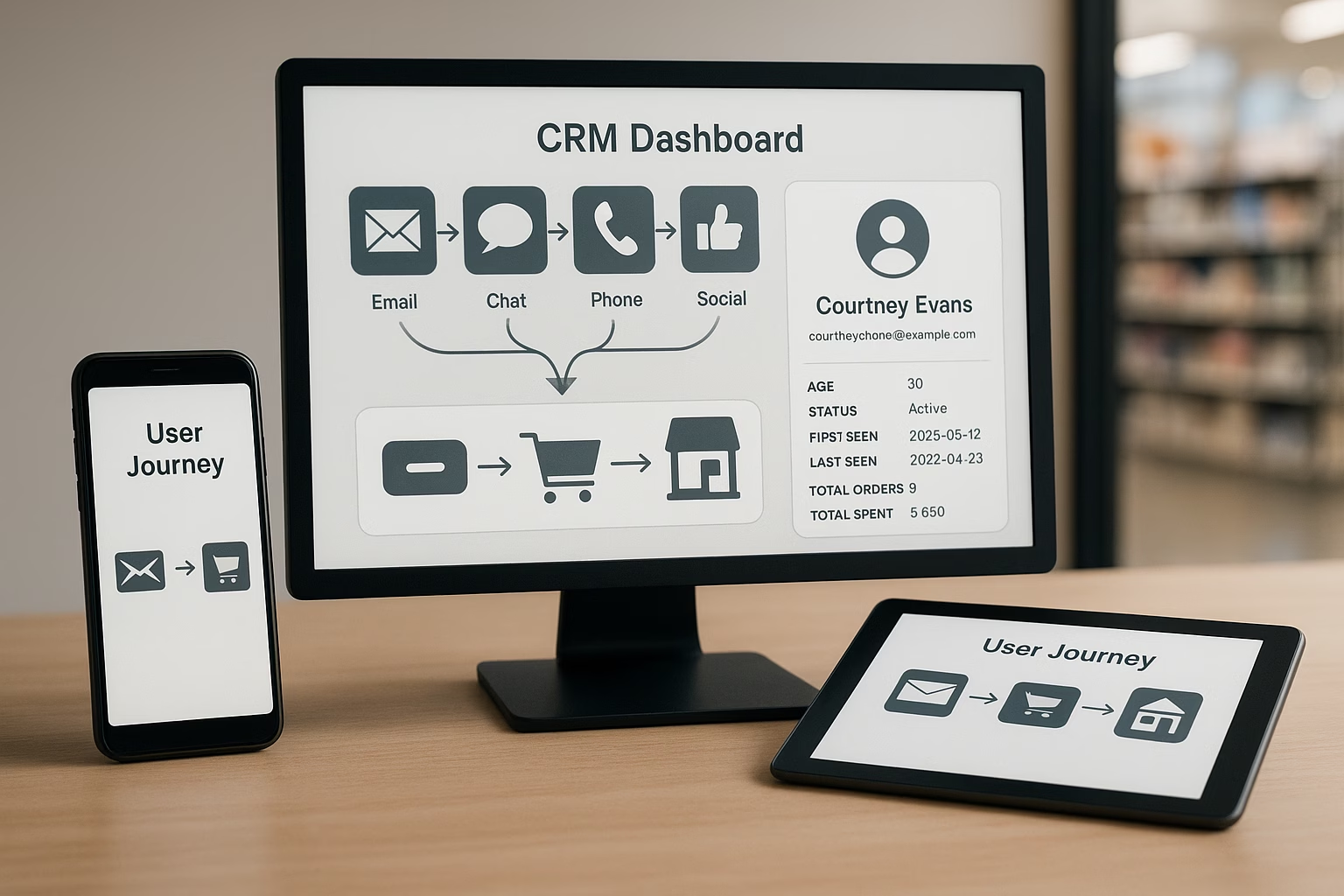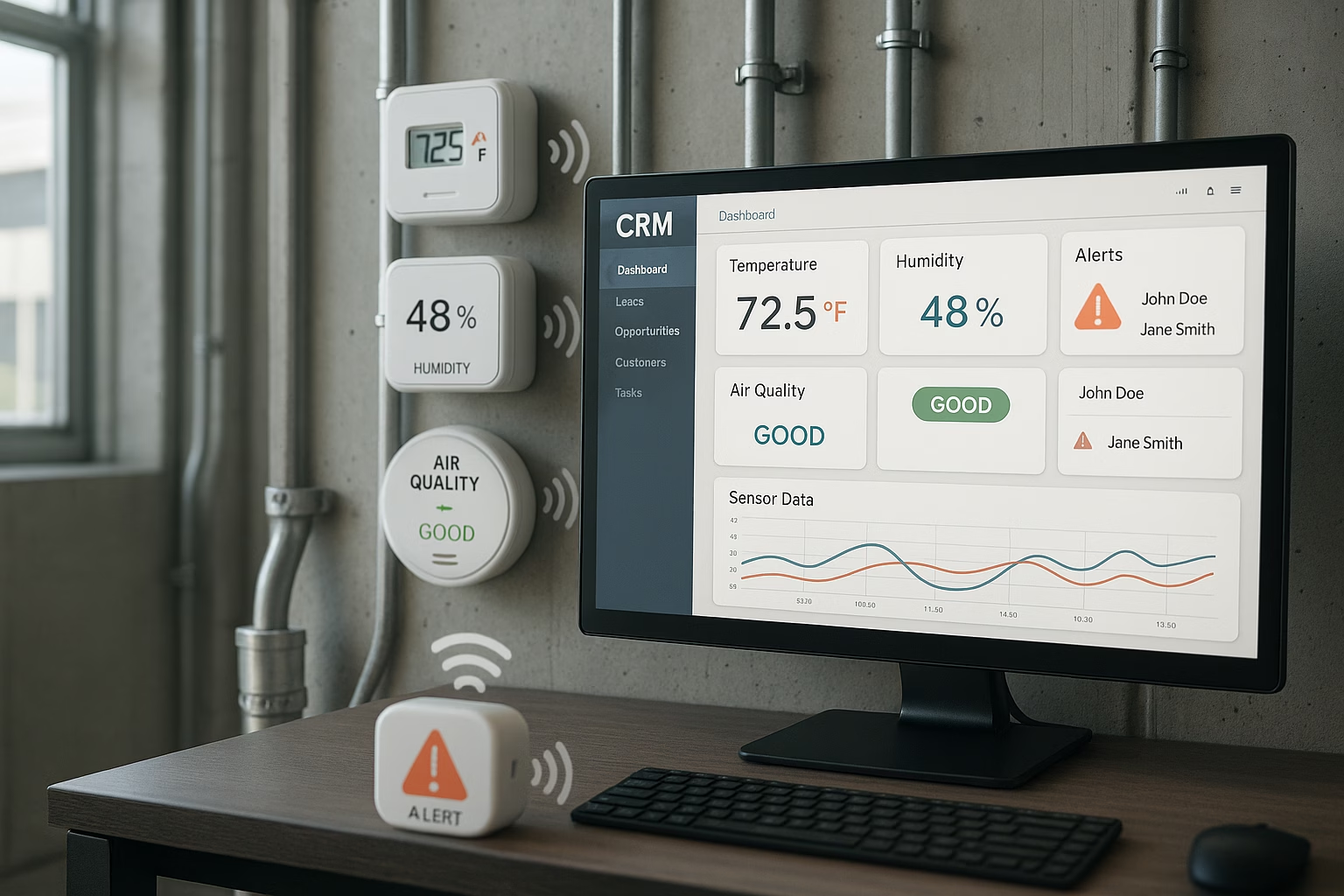By Martin H. Morrissette, Sirocco CMO – Book time with me
As the pace of global change accelerates, the Future of Jobs Report 2025 by the World Economic Forum offers a comprehensive glimpse into how global forces will shape industries and workforces over the next five years. Drawing from insights shared by over 1,000 global employers across 22 industries and 55 economies, the report outlines the transformative macrotrends and skills reshaping the employment landscape. Here are some highlights.
Some key forces reshaping the labour market
Technological Transformation Advances in technology remain the most significant driver of change. Employers highlight the impact of artificial intelligence (AI), robotics, and energy technologies, with AI expected to transform 86% of businesses surveyed. However, this progress is a double-edged sword—fuelling both job creation in areas like big data, cybersecurity, and AI development, and job displacement in roles such as clerical and data entry. For organisations navigating these shifts, the demand for technology-related skills like AI, cybersecurity, and technological literacy underscores the importance of continuous reskilling. Additionally, creative thinking and agility will complement technical expertise, bridging the gap between human potential and machine capabilities.
Economic and Geopolitical Shifts Rising living costs, geopolitical tensions, and economic slowdowns are reshaping business priorities. Inflation and slower economic growth alone are predicted to displace 1.6 million jobs globally by 2030. Simultaneously, organisations are increasingly focusing on resilience—skills like flexibility and leadership have never been more valuable. Geoeconomic fragmentation, including trade restrictions and investment policies, is pushing businesses to re-evaluate supply chains. Interestingly, this has driven greater demand for roles in network security and leadership, as businesses adapt to fragmented global markets.
Green Transition As industries strive to meet sustainability goals, the green transition emerges as a critical trend. Nearly half of surveyed employers anticipate significant transformations driven by climate initiatives. Roles such as renewable energy engineers, environmental specialists, and electric vehicle experts are among the fastest-growing jobs. For organisations, the challenge lies in bridging the skills gap to meet demand for these specialised roles.

Emerging Trends in Workforce Strategies
Reskilling and Upskilling: A Top Priority
Skill gaps present the largest barrier to business transformation, with 63% of employers identifying it as a major challenge. Addressing this, 85% of businesses plan to upskill their workforces, focusing on digital and green skills. As highlighted in the report, industries experiencing the greatest disruption—such as energy, manufacturing, and IT—are at the forefront of reskilling efforts. Employers are increasingly investing in modular training programmes, micro-credentials, and partnerships with educational platforms to deliver targeted skill-building initiatives. Transition programmes, such as reskilling academies, are gaining traction, enabling employees to pivot from declining roles to emerging ones. Notably, half of surveyed employers intend to prioritise internal mobility, highlighting the importance of retraining existing talent rather than seeking external hires. For you, this means exploring training initiatives that align with your organisational goals. Are you leveraging partnerships with education providers or investing in micro-credential programmes?
The Role of Diversity and Inclusion
Diversity, equity, and inclusion (DEI) efforts are expanding globally. The report highlights that organisations with strong DEI strategies have a higher likelihood of attracting talent, with 83% of surveyed employers implementing such initiatives. Employers are not only addressing gender imbalances but also expanding efforts to include underrepresented groups such as ethnic minorities, older workers, and individuals with disabilities. For industries facing acute labour shortages—including healthcare and education—broadening talent pools through inclusive hiring practices presents a significant opportunity. Furthermore, four times as many employers compared to two years ago now recognise the business value of tapping into diverse talent pools. This trend underscores a growing understanding that inclusivity drives innovation and improves workforce resilience. If your organisation hasn’t already, now is the time to assess and strengthen your DEI initiatives. What steps are you taking to tap into underrepresented talent pools?
AI’s Influence on Workforce Dynamics
By 2030, AI is expected to automate tasks across a wide range of sectors, with nearly 40% of skill sets requiring updates. Yet, the focus on human-machine collaboration suggests that AI is less about replacement and more about augmentation. Employers anticipate AI to complement human capabilities in areas such as decision-making, problem-solving, and creativity. This collaborative approach is particularly evident in roles like project management, analytics, and customer experience, where AI tools enhance productivity without displacing workers. Additionally, industries such as healthcare are leveraging AI to assist professionals in diagnostics and personalised care, reinforcing the narrative that AI’s potential lies in empowering rather than replacing human workers. However, the disparity in AI adoption between advanced and emerging economies remains a challenge, emphasising the need for equitable access to technology and training. Consider how your organisation is integrating AI tools. Are you focusing on enhancing your team’s productivity through collaborative AI solutions?
Challenges and Opportunities for Industries
Manufacturing and Energy
The integration of robotics and energy storage technologies continues to revolutionise manufacturing, reducing costs while creating demand for specialists in process automation and renewable energy systems. The report also highlights the rise of “circular manufacturing,” where businesses focus on sustainable practices like recycling and resource optimisation, creating new roles in environmental engineering and waste management. For the energy sector, advancements in battery storage and renewable energy generation are driving a shift in workforce needs, with roles like solar installation specialists and grid optimisation experts emerging as critical.
Telecoms and Real Estate
With the expansion of digital access, telecoms are investing heavily in infrastructure, particularly in rural and underserved areas, to support growing demand for connectivity. This is creating opportunities for roles such as network optimisation specialists and IoT engineers. In real estate, urbanisation and sustainability are key drivers of change. Developers are increasingly incorporating smart technologies and green building standards, leading to a demand for expertise in energy-efficient design and urban planning. Additionally, the demographic shift towards aging populations is prompting growth in residential care and assisted living projects, opening avenues for healthcare-focused real estate initiatives.
Healthcare and Education
The demand for healthcare roles, such as nursing professionals and personal care aides, is surging due to aging populations. Simultaneously, education sectors are adapting to growing working-age populations in emerging economies. Employers are exploring e-learning platforms and hybrid teaching models to bridge talent shortages. For decision-makers, aligning workforce strategies with these trends—such as recruiting educators skilled in digital tools—is essential.

Preparing for the next five years
For leaders and decision-makers like you, navigating this era of transformation requires strategic foresight and a proactive approach to workforce planning. Prioritising upskilling, digital literacy, and adaptability will not only future-proof your organisation but also ensure its competitive edge. Equally important is fostering a culture of innovation where people and technology collaborate seamlessly. By investing in the right tools and training, you can empower your workforce to excel. Beyond internal strategies, engaging with broader trends such as sustainability goals, inclusive hiring, and technology integration will prove critical. As we near 2030, the dual focus on digital transformation and sustainability remains paramount. Businesses that can harness these trends while actively supporting their workforce will not just survive, they will thrive in the years to come.
For a deeper dive into the findings, the full Future of Jobs Report 2025 is available on the World Economic Forum’s website.
As the job market evolves and digital transformation accelerates, businesses are increasingly turning to technology to stay competitive. The future will require organisations to be agile, data-driven, and efficient, ensuring your teams are empowered with the right tools and systems. This is where partners like Sirocco come in. By focusing on scalable solutions, seamless integrations, and AI-driven insights, Sirocco helps businesses across various industries adapt to these changes. Our expertise in sales automation, marketing setup, and AI solutions ensures that your team can thrive in this shifting landscape, making the most of digital tools to drive productivity, growth, and long-term success. Contact us if you want to chat about your challenges and ambitions.










